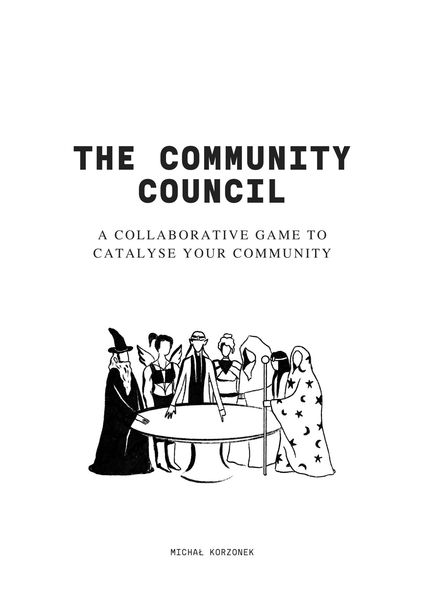The Community Council
A Collaborative Game to Catalyse Your Community

You can get the 14-page pdf game manual here. You can offer a donation to encourage me to create more games, or enter a coupon GIFT at checkout and get the game for free.
The game was prototyped during Pico Autumn Community Gathering.
Below is the first section of the manual.
🧙♂️
Purpose
The Community Council is a collaborative meta-game, designed to catalyze projects and facilitate community weaving.
Overview
The game moves through six rounds:
- Opening – mindfully transitioning into the game
- Calls - starting projects for the benefit of the community
- Questions - accessing collective intelligence
- Requests - verbalizing needs
- Gifts - giving from the heart
- Closing - providing closure to the experience
The game is modular. Start with the opening, end with the closing, and pick other rounds to go through as desired. Note that new communities tend to call numerous projects, and it might be beneficial to extend the Round of Calls during the first game, even if you’d have to skip the other rounds. Play it by ear.
Allow around two hours to play the game. It’s hard to keep focus in the group for longer.
The game can be played as a recurring activity, for example monthly or bi-annually, providing a rhythm to the community.
The game is designed for presential play in a group of 5-15 people, although it can be adapted for a different group size, as well as virtual play.
Use this manual as a blueprint and create new iterations of the game that would suit better the context of your community.
Feel free to share your experiments with me – you’ll find my contact details at the end of this manual.
Materials
- Big piece of paper (ideally A3 or bigger) for the Community Map
- Pens or pencils, one per person
- (optional, but useful) one permanent marker
- counters (eg. stones, dried chickpea), three per person
- post-its or index cards, four per person
- up to four blank sheets of A4 paper for the list(s) that will be created during the game.
- (optional, but fun) a gong or bell for the timekeeping
Community Map
The big piece of paper will serve as a shared artifact collecting ideas. You can draw an actual map of your community to reinforce your local context, or keep it blank.
Facilitation
The game is designed to allow the facilitator to play. To make it easier, I highly recommend distributing the roles between participants.
Roles
- Facilitator: reading this manual, prepping in advance, guiding the process.
- Time Keeper: keeping an eye on the flow of time, eg. with a gong or timer ringing every 30m, or timing each round.
- Connection Keeper –> compiling the List of Connections during the round of Calls.
You can also have a designated person to write down questions, requests and gifts, although this can be more intimate space and participants might feel more comfortable if no record would be made. Feel into it.
Alternatively, you can experiment with a rotating facilitator for each round.
